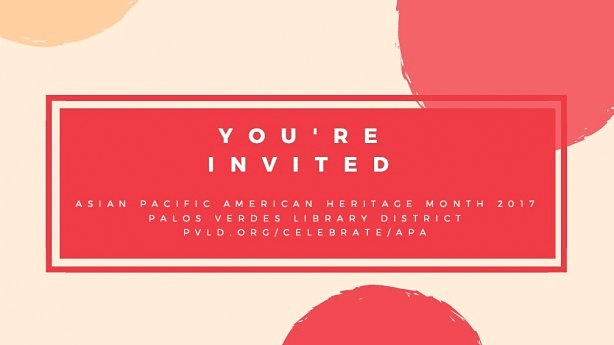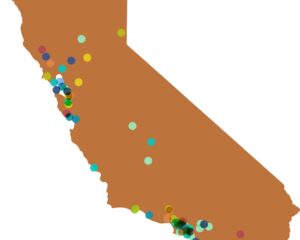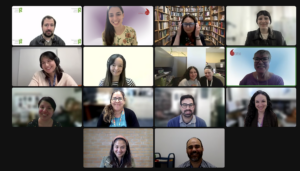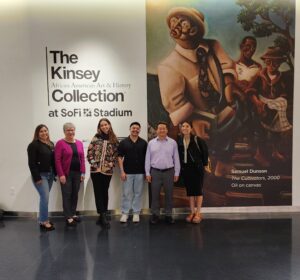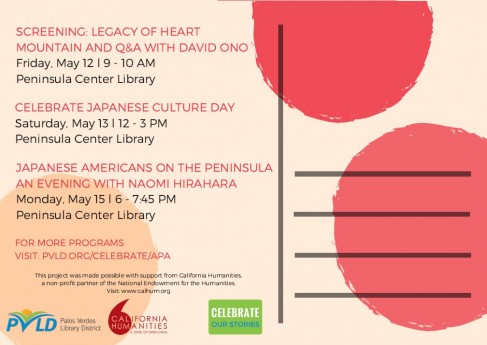 Project Description: To serve their growing, changing, and diverse community on the Peninsula, including a growing Asian Pacific population, the Palos Verdes Library District will host a series of public programs exploring the Japanese American experience and influence in Southern California. In commemoration of Asian Pacific Heritage Month in May 2017 and in recognition of the important role Japanese Americans played in the area’s history, programs will share stories about the experience of local Japanese Americans before and after World War II internment, explore topics of race, culture, and ethnicity, and illuminate aspects of Japanese music, art, and cultural heritage.
Project Description: To serve their growing, changing, and diverse community on the Peninsula, including a growing Asian Pacific population, the Palos Verdes Library District will host a series of public programs exploring the Japanese American experience and influence in Southern California. In commemoration of Asian Pacific Heritage Month in May 2017 and in recognition of the important role Japanese Americans played in the area’s history, programs will share stories about the experience of local Japanese Americans before and after World War II internment, explore topics of race, culture, and ethnicity, and illuminate aspects of Japanese music, art, and cultural heritage.
We interviewed Laura Ishizaka and Lessa Kanani’opua Pelayo-Lozada, Humanities for All Quick Grant recipients and librarians at Palos Verdes Library District about their project and the series of upcoming events featuring the culture and history of the Japanese American community in the Peninsula.
Please tell us a little about your project?
Our project Japanese Americans on the Peninsula: Learning from Our Past to Look to Our Future is a series of programs during Asian Pacific American Heritage Month (APAHM) in May. We are highlighting our Japanese American community for our first APAHM celebration to honor our community’s Japanese American farmers who settled the Palos Verdes Peninsula in the early 1900s and highlight our increasing and changing Asian Pacific American demographic.
What sparked your interest in doing it?
The Palos Verdes Library District prides itself on being an inclusive community environment. As our community’s demographics change, we want to continue to make sure all of our diverse cultures are represented in a thoughtful way. We wanted to move beyond specific holidays to include all aspects of our cultures – food, music, dance, literature, and more, through celebrating heritage months. We chose APAHM to start due to the rich history of Japanese Americans on the Peninsula and the increase in APA residents in the last census by nearly 5% to become a quarter of the Peninsula’s population and continues to grow. In the early 1900s about 2000 coastal acres on the Peninsula were cultivated by Japanese farmers and would go on to produce strawberries, garbanzo beans, tomatoes, flowers, and more. For more information about the history of these Japanese farmers on the Peninsula, click here.
Why do you think it’s important for the community to know more about this history?
In order to have a better future, we must understand where we came from and confront the issues of our past. PVLD is committed to “sharing the unique history of the Peninsula”, and that includes a history of a vibrant Japanese American community who were forced to leave their farms and way of life during World War II. Most of our Japanese American community was sent to Poston Concentration Camp and were forced to give up their possessions, farms, and lives – starting over from scratch when they returned. This is a part of our history and something that must not be repeated as our communities change and people seek to understand new members of their communities. By starting with the history of Japanese Americans on the Peninsula, we can move forward sharing all of the histories of our diverse community.
What do you hope will result from the project?
We are cognizant that diversifying communities face unique challenges as demographics change, and we hope that our program will be celebratory as well as act as an opportunity for our community to engage in the topic of race and culture from a historical and modern lens. We believe these conversations will allow our community to gain knowledge of different cultures, enlarge understanding of similarities between cultures, and learn about the history of our diversifying community.
What are your plans for the future?
In the future we hope to continue celebrating diversity through small and large scale programs. We intend to use this pilot program as a template for future cultural heritage programming for our library and beyond. For example, we will continue celebrating heritage months such as Hispanic Heritage Month, Native American Heritage Month, Women’s History Month, LGBTQ Pride Month, and more. For future APAHM months, we will focus in depth on other APA cultures as we did with our Japanese American community.
Lastly, why do the humanities matter?
The humanities help us know what is at the core of the human spirit. Through experiencing the arts and learning about history we share stories, stories that help create our communities, bond with one another, and better understand neighbors, colleagues, and friends.
Laura Ishizaka – Project Director
Laura Ishizaka is an Adult Services Librarian with the Palos Verdes Library District. She has previously worked with other library systems in Los Angeles and on projects such as an Immigration Task Force to help bring citizenship resources and materials to communities throughout Los Angeles County. Laura feels strongly about libraries as places where communities connect, and works to create programming and opportunities for community members to come together and share their diverse stories.
Lessa Pelayo-Lozada – Project Co-Director
Lessa Kanani’opua Pelayo-Lozada is a Young Readers Librarian at the Palos Verdes Library District and President of the Asian Pacific American Librarians Association (APALA). She was a leader in the creation of APALA’s family literacy program, Talk Story: Sharing Stories, Sharing Culture, which focuses on culturally appropriate tools and resources for family APA library programs. Lessa also co-authored the book Hawaiians in Los Angeles, which takes a look at Native Hawaiians creating community and perpetuating their culture on the continent.
The Palos Verdes Library District is a nationally recognized, award-winning library system serving all four cities on the beautiful Palos Verdes Peninsula. We collaborate with our community to create environments for learning and inspiration, and to share the unique history of the Peninsula. PVLD is an independent special district governed by a publicly elected Board of Trustees.
Please visit the library website for more information.

